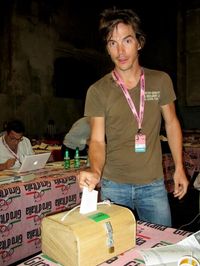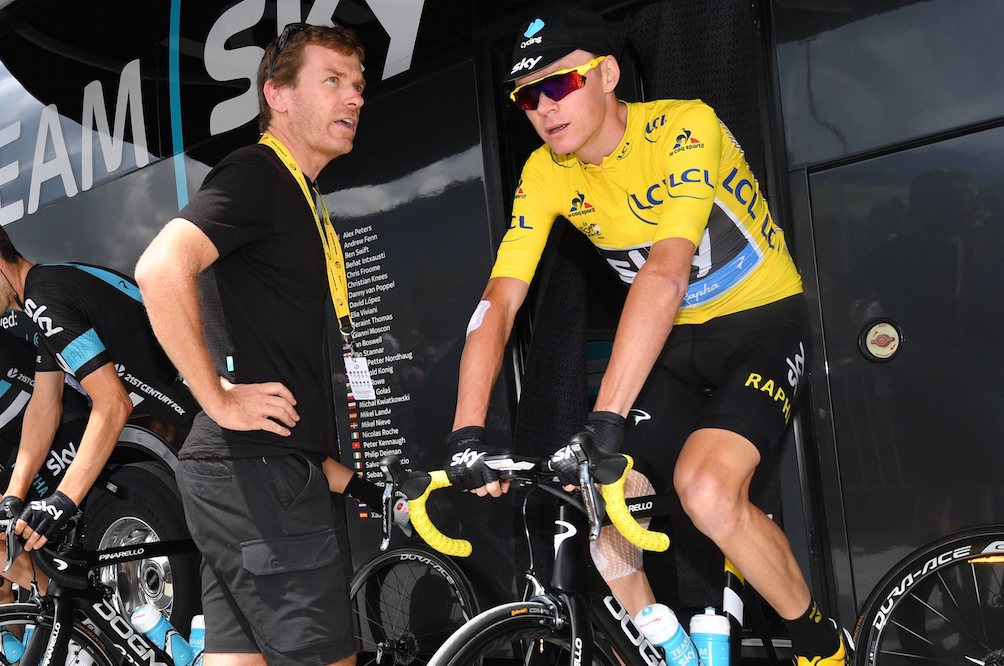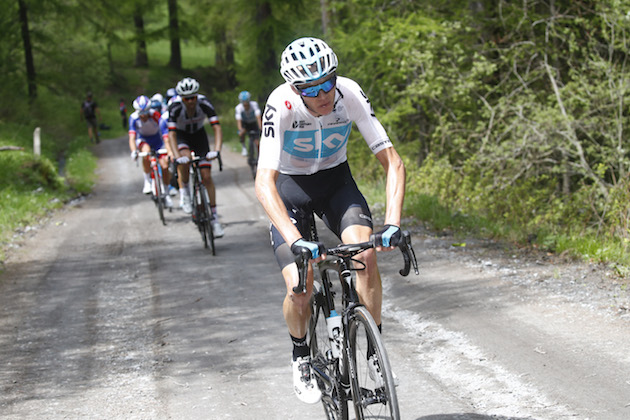Team Sky coach Tim Kerrison defends Chris Froome and hits out at critics
Kerrison said Froome's salbutamol case "shouldn't take this long to resolve"


Tim Kerrison with Chris Froome at the 2016 Tour de France (Watson)
Tim Kerrison, the star coach behind Chris Froome, Geraint Thomas and others in Team Sky, has hit out at Froome's critics and defended his rider.
The Australian took aim at Bernard Hinault for stirring the public and media with his comments this week ahead of the 2018 Tour de France. Hinault suggested riders should strike over Froome's participation with an asthma drug case still unresolved.
"If things are presented in a way that incites or sensationalises, or fuels anger or resentment towards Chris, then I don't think that's very responsible," Kerrison told The Guardian.
"I think fair treatment in the media is a responsible requirement to ensure the riders' safety."
Froome tested over the allowed limit for asthma drug salbutamol on his way to win the 2017 Vuelta a España. Due to the complexity of the case and the legal papers involved, a judge has yet to begin the hearing. A decision could come later this summer.
Meanwhile, because this is specified substance, Froome is free to race. He won the Giro d'Italia this May and is aiming for a fifth Tour title in July.
The latest race content, interviews, features, reviews and expert buying guides, direct to your inbox!
"I'm very confident that he is innocent. There have never been any question marks for me," Kerrison said.
"Guilty or innocent, it shouldn't take this long to resolve. If he's found to be innocent it just shouldn't take the months and months that it has done to resolve the situation."
Critics of Froome, questioning if he is a clean athlete, and his and Sky's decision to race while the case goes ahead have spoken loudly.
David Lappartient, cycling's governing boss, said that Froome should sit out. His rivals like Tom Dumoulin and Romain Bardet said the same, with much heavier words from followers filling social media.
Froome does brush off some critics and comments; "that doesn't make it right though," Kerrison said.
"Chris is human and it's only natural that he feels a sense of injustice over the way he's been treated or reported. But when it's time to focus on his performance, he's uniquely good at putting all that to one side and delivering."
Froome's fight back and victory in the Giro d'Italia could be seen as one of cycling's epic rides in decades to come.

Froome crashed twice early in the race and trailed by nearly five minutes ahead of the third week. On the second-last mountain day, Team Sky cracked race leader Simon Yates (Mitchelton-Scott) and Froome launched an 80.3-kilometre solo move that saw him win the Jafferau stage and take the race lead.
Not since 1949, with Fausto Coppi, had a rider gone on such a long solo move to take command of the race. Then, he rode away with 192 kilometres, leaving Gino Bartali saying, "he's crazy."
Froome's monumental ride generated praise, but also scepticism.
"We have never seen a ride like that from him in a race," Kerrison said.
"Ultimately it was Chris's idea to do that. He knew the Finestre climb and despite what people say about his bike handling skills, they're actually pretty good and he doesn't mind a bit of dirt road.
"Other than trying to help to inform and understand what went into that performance there's only so much we can do. But I can absolutely guarantee that there was no illegal performance enhancement."
Gregor Brown is an experienced cycling journalist, based in Florence, Italy. He has covered races all over the world for over a decade - following the Giro, Tour de France, and every major race since 2006. His love of cycling began with freestyle and BMX, before the 1998 Tour de France led him to a deep appreciation of the road racing season.
